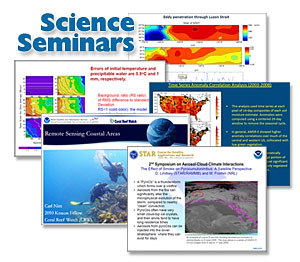
STAR SeminarsSTAR SeminarsWelcome to the STAR science seminar listings page. The STAR seminar series listings include STAR seminars, NOCCG seminars starting in 2019, and CoastWatch seminars, newly added for 2022. NOAA's Ocean Color Coordinating Group (NOCCG) is a NOAA organization founded in 2011 by Dr. Paul DiGiacomo, Chief of SOCD at NOAA/NESDIS/STAR and was formally recognized by NESDIS in response to the National Research Council’s 2011 report, “Assessing the Requirements for Sustained Ocean Color Research and Operations.” The purpose of the NOCCG is to keep members up to date about developments for satellite ocean color. With membership that includes representatives from all the NOAA line offices, NOCCG holds monthly meetings and an informational seminar, advertised widely both within and outside of NOAA, especially to the US ocean color community. The NOAA CoastWatch Seminars, begun in January 2022, feature two speakers per month from the NOAA CoastWatch Science or Application Team presenting information that will be of interest to NOAA CoastWatch Users and the entire CoastWatch Team. Questions: All seminar times are given in Eastern Time 22 April 2026
Contribute to the STAR Seminar SeriesWould you like to present a seminar?To submit a new seminar for the series, fill this form: STAR Seminar Form. We are always looking for new and interesting presentations!
|
||||||||||||
 Other Seminar Series
Other Seminar Series